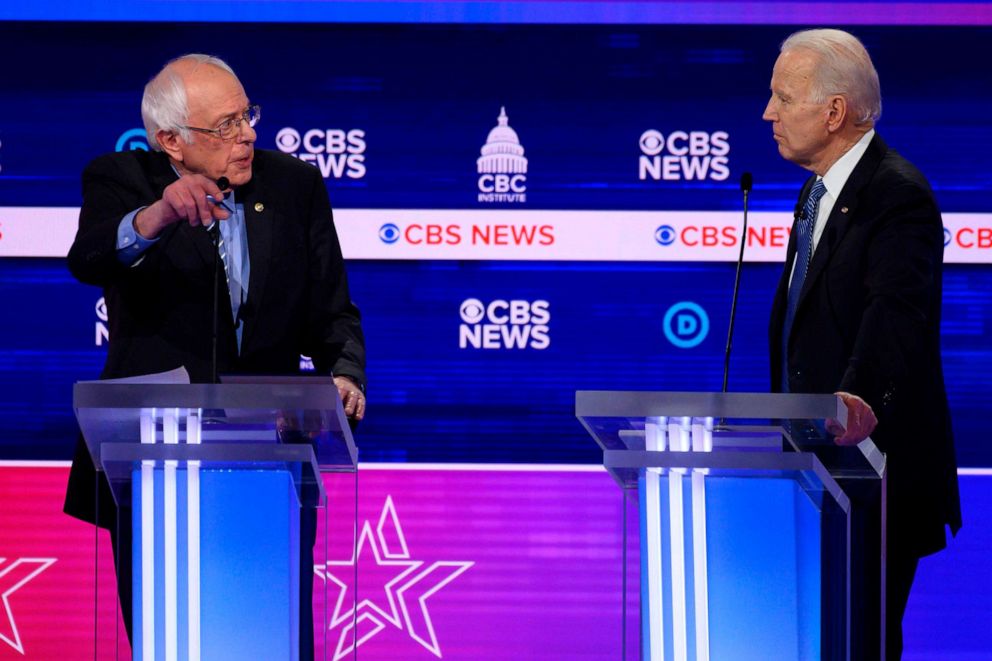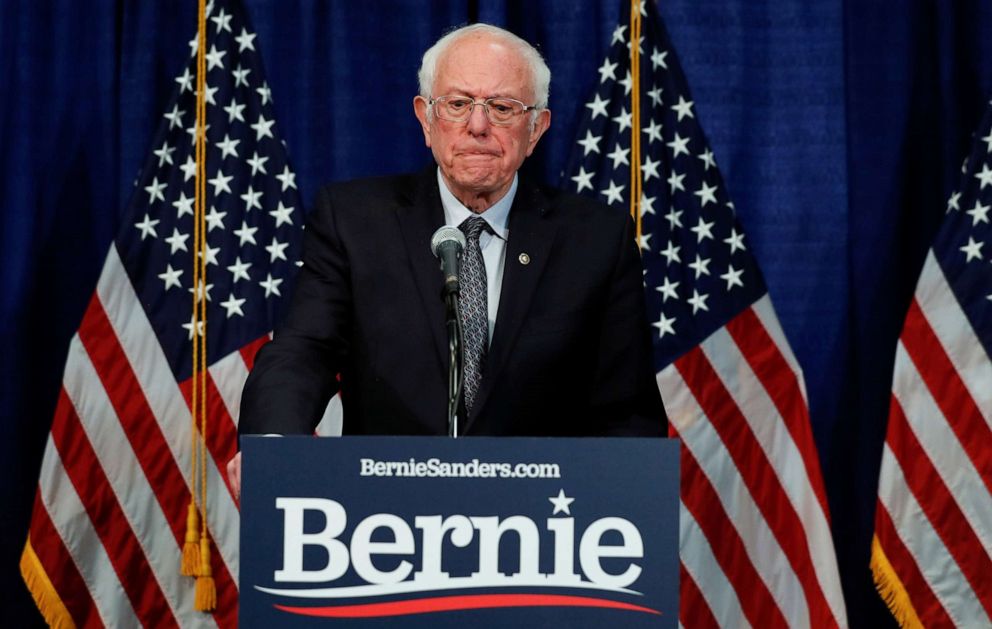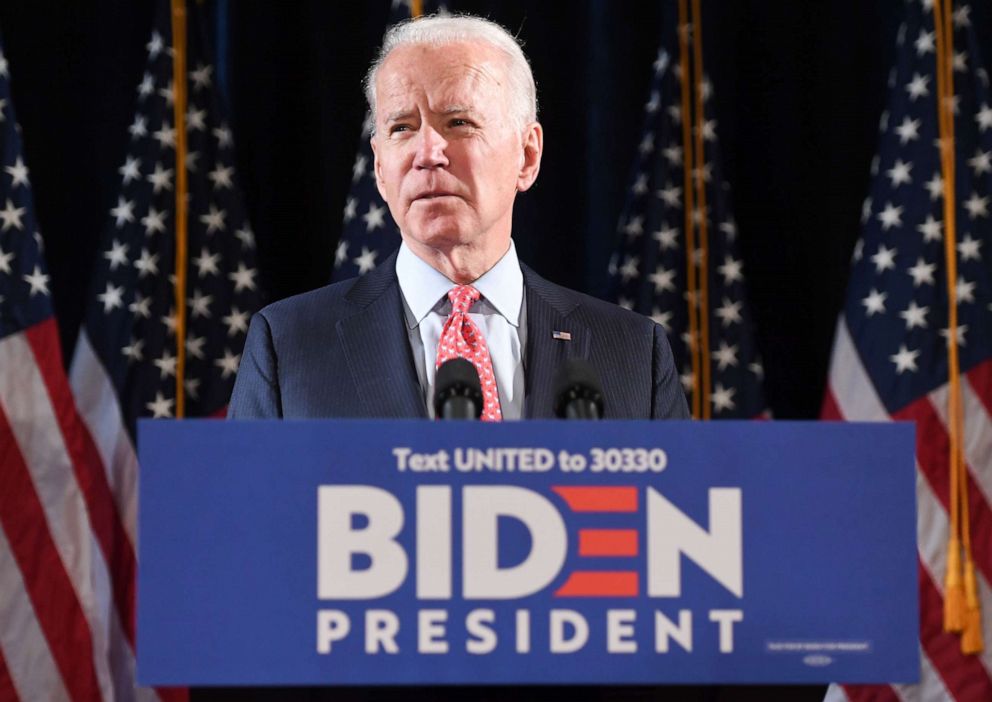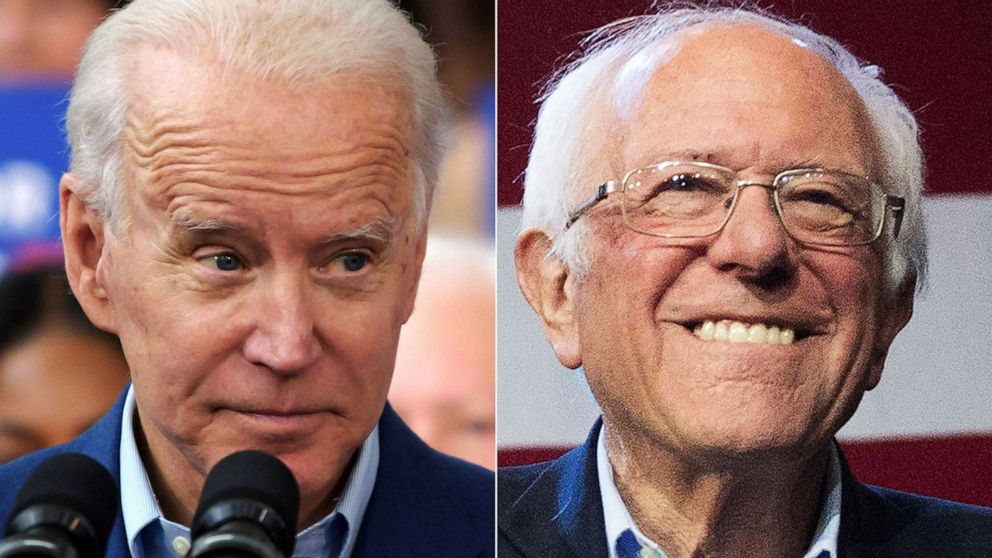Biden, Sanders to face off in first one-on-one debate of Democratic race, as coronavirus halts 2020 campaign
It’s the debate that Bernie Sanders always wanted, and one that Joe Biden simply needs to endure.
It’s also a debate that Sanders vowed he would take part in, a day after suffering another round of steep losses to the former vice president, telling reporters in Burlington Wednesday, "On Sunday, I very much look forward to the debate in Arizona with my friend, Joe Biden."
In the two-man race, it is Biden who is currently winning the popular vote and leading in the all-important delegate hunt, after a stunning political revival at the tail end of the first four early nominating contests, with at least 819 delegates estimated for Biden and 675 for Sanders so far.
But the matchup, hosted by CNN and Univision, also comes as the entire presidential contest is upended by a global pandemic. The novel coronavirus, known as COVID-19, thrust the 2020 campaign into unchartered virtual terrain, in which the candidates are campaigning without campaigning, shifting to online events, instructing all employees to work from home or telework, and grounding field operations to a halt.
Even the debate itself was moved from Phoenix, Arizona to CNN's studio in Washington, D.C. "out of an abundance of caution" with no live audience, according to the Democratic National Committee.

Despite facing a narrower path to the nomination after Biden’s string of victories since the South Carolina primary, Sanders brushed aside the notion of an exit from the race earlier this week - confirming only that he was sticking around at least through Sunday night - and instead leaning into his ideological fortitude as he ticked through a list of policy questions he wants Biden to answer.
Sanders may have conceded "we are losing the debate over electability" but the Vermont senator ceded no territory on his commitment to expanding health care, lowering student debt, tackling climate change and addressing childhood poverty. Without taking aim at Biden directly, he offered an early glimpse of the first one-on-one matchup between him and his chief moderate rival, and the lengths he will go to protect his liberal agenda that he has urged the Democratic Party to adopt since his first run in 2016.
"Joe, what are you going to do for the 500,000 people who will go bankrupt in our country because of medically related debt," he began.
"Joe, what are you going to do to end the absurdity of the United States of America being the only major country on Earth where healthcare is not a human right," he posed. "Joe, how are you going to respond to the scientists who tell us we have seven or eight years remaining to transform our energy system before irreparable harm takes place to this planet because of the ravages of climate change?"
"Joe, at a time when most young people need a higher education to make it into the middle class, what are you going to do to make sure that all of our people can go to college or trade school, regardless of their income," he continued.

Sanders' approach, signaling perhaps his willingness to start forming a bridge between Biden's campaign and his own in an effort to continue to influence the direction of the party, also brings forward his steadfast belief that he is winning on the issues.
In every state that has voted thus far this primary season, more Democratic voters support replacing all private health insurance with a single government plan for everyone than oppose, according to exit polls.
In a chaotic race, Sanders continues to be the constant, the one with a singular mission driving his progressive movement, and delivering his same pitch of "not me, us."
The showdown on Sunday is Sanders' chance to take on the establishment and the moderate faction without a crowded stage, without another progressive in the race, and with only one other opponent to square off against. But it also could potentially be Sanders' last chance to make his case for his pursuit of the White House before a national audience, as a second-place finish in a Democratic primary looks all the more likely.
After notching over a dozen wins in the past two weeks, a more confident Biden emerged and is more strategically running his campaign as an alternative to the current administration, with a near-singular focus on contrasting himself with President Trump, rather than his more imminent rival.
"Unfortunately, this virus laid bare the severe shortcomings of the current administration. Public fears are being compounded by a pervasive lack of trust in this president, fueled by adversarial relationships with the truth that he continues to have. Our government's ability to respond effectively has been undermined by hollowing out our agencies and disparagement of science," he said in a speech Thursday in Delaware amid the health crisis.
Biden, who has shown resiliency throughout the 2020 campaign, hopes to maintain the momentum he has seen since his win in South Carolina last month, even while sidelined from the trail.
In a memo circulated to campaign staff urging them to work from home starting Saturday to minimize the spread of the coronavirus, two members of his campaign leadership, Anita Dunn, senior advisor to the campaign, and Jen O'Malley Dillon, the newly installed campaign manager, assure that the Biden team's message and goals are unchanged, but they are seeking more "creative" ways to achieve them.

"The functions of this campaign - disseminating the Vice President’s message, educating voters, and earning their votes - will not change. We will continue to implement our mission: putting together a broad and diverse coalition to make Donald Trump a one-term president and restoring the soul of the nation. Our challenge now is to do that in new and creative ways that mitigate public health risk. We are confident that this team can rise to this challenge," Dunn and O’Malley Dillion wrote in the memo.
The debate might offer Biden a key opportunity to begin to make overtures to Sanders' loyal army of supporters, particularly the core of his base, younger voters, in an effort to broaden his coalition, which already includes African Americans, older, and white working class voters, many from the suburban areas that will be battlegrounds come November.
Despite a rout in the key swing state of Michigan, and high turnout pointing to strong Democratic enthusiasm across the board so far, Biden continues to lag behind Sanders in support among young voters and Independents, according to exit polls. As he prepares for a competitive race against the president, Biden's ability to make inroads with those voters will be crucial to assembling a coalition that can actually defeat Trump.
Even if Sanders once again seeks to expose what he sees as Biden's general election vulnerabilities on Sunday, Biden, as he has done for most of the campaign, will likely keep most of his attention on attacking the president during the nationally-televised event.
As the Biden campaign looks ahead with an eye towards November, Sanders, during his Wednesday press conference, did not mention the upcoming contests on Tuesday, in Arizona, Florida, Illinois, and Ohio, or beyond.
The Democratic primary might finally be slowing down, but first, the final two, after up to 28 candidates sought the nomination, will face off for what is planned as the primary race's penultimate debate on Sunday at 8 p.m eastern time.




